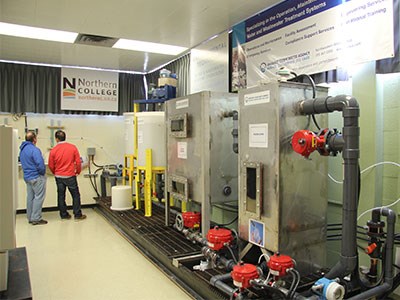For students training to be water treatment specialists, the best hands-on experience can be found working in municipal labs. But provincial regulations won’t let students experiment with municipal drinking water, and so, until now, that experience has been elusive.
Northern College has solved that problem by building its own water treatment facility.
At its Kirkland Lake campus in December, the college cut the ribbon on a brand-new, miniature version of a municipal water treatment plant where, because the plant operates independently from the municipal water system, students in the environmental technician – water and wastewater systems operations program can train without fear of impacting the public water supply.
The project has been done with the support of the Ontario Clean Water Agency (OCWA), the Crown corporation that oversees municipal water treatment services for more than 500 municipalities across the province.
Northern College president Fred Gibbons said the pilot plant finally gives students the experiential learning the college strives to provide in all its programming.
“We’ve developed a fully operational water treatment plant where we take water from the lake and put it through the full process and have potable drinking water at the other end, so our students are able to physically get involved in creating potable drinking water,” Gibbons said.
Testing done on site allows them to not only understand the filtration process and chemicals that are used, but they also participate in the chemistry analysis to see how close they are to having potable water that’s suitable for drinking, he said.
Gibbons thinks this training will have “immense appeal” down the road; in particular, with regard to First Nation communities, which have faced challenges accessing and sustaining clean and safe drinking water.
The school is also working on off-shore partnerships with schools in China and India, countries that face similar challenges, to have students come to Northern for their training.
Beyond earning a certificate, the experiential training gives students a leg up when looking for work post-graduation.
“It’s the closest we can come to getting the students that three to five years’ experience employers are looking for,” Gibbons said.
Because water treatment plant operators are required to continually enhance their education to maintain certification, Gibbons said Northern has a secondary opportunity to work in conjunction with OCWA to serve as a regional training centre so that Northern Ontario operators don’t have to travel to the main centre in Walkerton for upgrading.
This isn’t the only area in which Northern is trying to set its students up with the best experiential training possible.
The school is also working on developing an integrated emergency services complex, a facility to collectively house its police foundations, pre-service firefighting and paramedics programs that could serve as a standard for emergency training services in the province.
The college wants to collaborate with the municipality’s fire department to have all its equipment and training housed in one facility, which, Gibbons said, could reduce costs, share resources and offer better response time to fires.
Because Northern is at the geographical centre of the area served, it makes sense to house the facility on campus, Gibbons said. It would also integrate well with three-storey burn building built on the Timmins campus three years ago.
Volunteer and full-time firefighters are required to undergo the same training, and so by providing access to firefighters and students, everyone is held to the same standard, he added.
“It’s a challenge for the college to keep up with technology, but the city does a good job of that,” Gibbons said. “So the quid pro quo is if we make training space and trainers available for the city to use, the college gets access to technology it can’t afford.”
The college also wants to gauge the interest of the Timmins police force in co-locating as well.
“This is a model of collaboration that doesn’t exist, to my knowledge, elsewhere in the province, and I think it’s a great concept that should be explored for other municipalities as well,” Gibbons said. “So let us do it and prove it and deliver on everything we think we can deliver on and then look at the possibility of replicating where it makes sense elsewhere.”
The city has stated its support for the plan, but funding must be raised to make it a reality. The college has $500,000 in reserves to go towards the project, but with an estimated $8-million price tag, support from senior levels of government is needed before the facility can go ahead.




